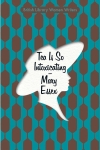Tea Is So Intoxicating does not only have a splendidly British title, it is also a novel by an author who should be rediscovered: Mary Essex. Her impressive oeuvre has been long forgotten but her mastery of combining creativity and commerce should gain her more attention.
By Emily Lüter
»I shall turn this into a tea-house, with lunches if requested, and shall serve pleasant meals in the orchard« announced David, »and with my penchant for cooking I ought to make a fortune.«
»O dear!« said Germayne.
O dear, indeed. Published in 1950 and set in post-war England, Tea Is So Intoxicating explores a society in which traditions and ideas of propriety clash with blurring class-boundaries and a changing economy. When the newlyweds David and Germayne endeavour to make a living with setting up a tea-house in the countryside, they must soon realise that the villagers hold on to the past more fiercely than they expected. Mary Essex’s novel, infused with a distinctly British humour, is about the challenges of negotiating old and new. She excels at capturing truly British characters and landscapes whilst portraying women who were often at the mercy of their husbands’ whims with sympathy and nuance. And yet, despite her tremendous initial success, she is now largely forgotten. It is high time modern readers rediscover and celebrate Essex’s wit and attentive social commentary.
Germayne, recently divorced from her stodgy husband, makes the annoying discovery that she might have made a mistake in remarrying. Her new husband has saved her from a life of dreariness only to put her into financial distress. When the war is over and Commander David finds himself unemployed and with no skills suited for any profession, he buys a dilapidated cottage with no drainage system to set up his own tea-house. After more or less successfully jellying greens he is assured of his success and invests all of his money and that of his friends. Whilst David disregards any criticism concerning his questionable business venture, Germayne tries to come to terms with how dependent her welfare is on the reliability of the men who make decisions for her. Increasingly, she and David are also confronted with the village’s hostility towards strangers with new ideas and the prospect of hikers and bikers in skimpy clothes who would flood the tea-house. Things do not look promising.
The Good Old MoneyWith writerly finesse Mary Essex (née Ursula Bloom) sketches idiosyncratic characters who are delightfully dislikeable. Residing at the end of the lane, Mrs. Arbroath controls the village like a remnant Victorian fossil.
For years Mrs. Arbroath had dealt justice from the manor, a large austere house…She was hedged in with enormous garden, screened from the vulgar gaze. It was a relic of the day when gentry were gentry, and held themselves aloof in grim superiority. Mrs. Arbroath was also something of a relic. She was tall and lean, and she wore tweeds and brogues, and had the sort of face that fits into the colour scheme of both.
She blackmails the placid, very worldly vicar Mr. Dene into scaring away Germayne and David; in which he does not succeed. As despicable as she is, Mrs. Arbroath does not let anyone get the better of her. Her character represents a time gone by and so she must die to make way for a new generation to navigate the uncertainties of post-war England.
As much as Tea Is So Intoxicating is a failed love story and a portrayal of village life, it also plays tribute to a historical period marked by severe rationing. David tries to make cream without cream, the item in question being unavailable most of the time. When his friends come to visit his new business they have to illegally use the petrol of their local vicar who has access to non-dyed fuel (in the 1940s petrol was dyed to control rationings). Essex exposes the romanticised rural idyll as one which can only be enjoyed by an affluent minority. In doing so, she frames Germayne’s choice to go back to her old life as a return to economic security – a decision that would have resonated strongly with contemporary readers. Even though Tea Is So Intoxicating is timeless in its portrayal of the English countryside, it is also very much a novel of its time.
Mary Essex, a Forgotten AuthorIs it easier for bestselling authors to be accepted as canonical if they are male? During her lifetime Mary Essex published more than 500 novels which gained her an entry into the Guinness Book of World Records. She was one of the most commercially successful authors of the 20th century and yet her name does not appear on academic reading lists. Essex was very fond of Charles Dickens and had read all of his novels by the time she was ten years old. But what was lauded in Charles Dickens – a man payed by the line and who added many a line to his infamously long novels to make money – cannot be allowed in a woman. Novel-writing and money-making tend to be more compatible when it comes to men. For a commercially acclaimed woman, on the other hand, the doors to the canon appear to be guarded by those who dismiss the merit of female authors’ works.
The ways of canon formation do not always seem clear, but critics and academics still largely neglect prolific women writers from the first half of the 20th century despite their output. Mary Essex, Helen Evans, Ann Stafford, Elizabeth von Arnim and many others deserve a place in the literary canon. The British Library Women Writers series, an initiative of the British Library, is publishing a »curated collection by female authors who enjoyed broad, popular appeal in their day. In a century during which the role of women in society changed radically, their fictional heroines highlight women’s experience of life inside and outside the home«. The novels in this series, and Tea Is So Intoxicating especially, were without a doubt financially successful in their day; and they are well crafted pieces of literature. We may find that commerce and canon are not categorically mutually exclusive terms when it comes to women and that, indeed!, women writers like Essex need to finally be recognised for their masterly work.
















